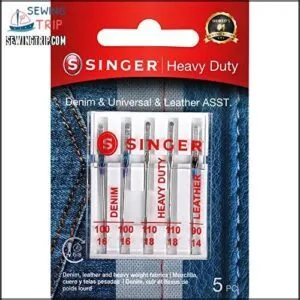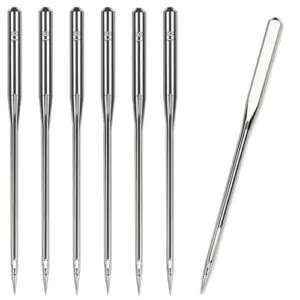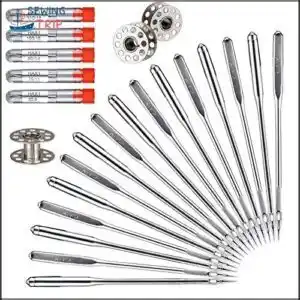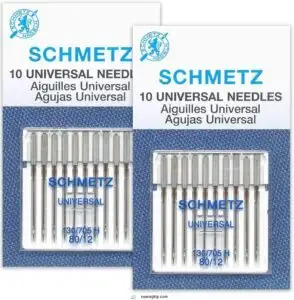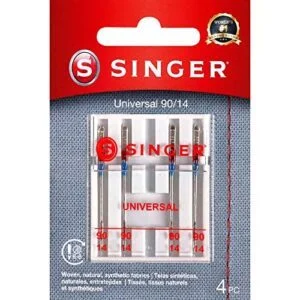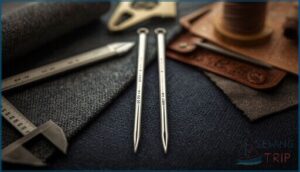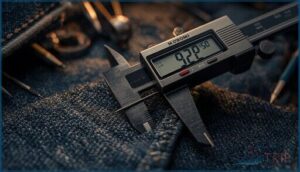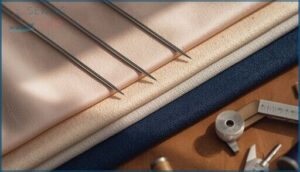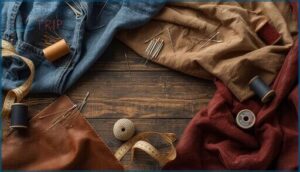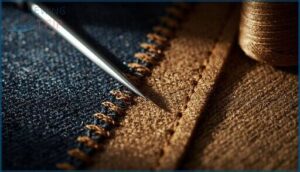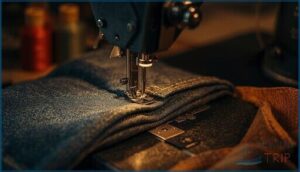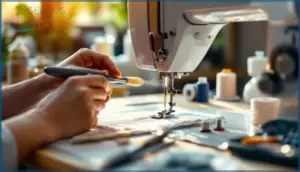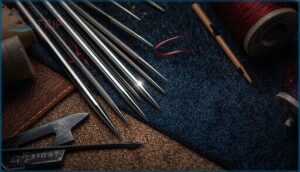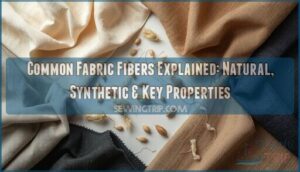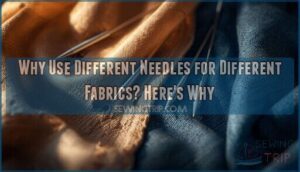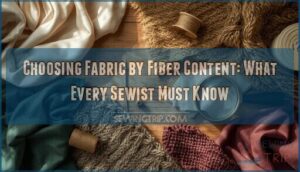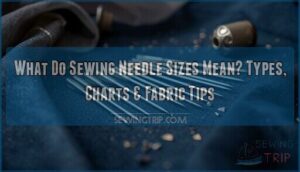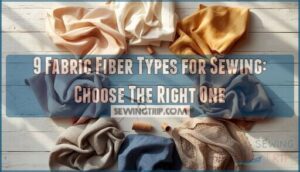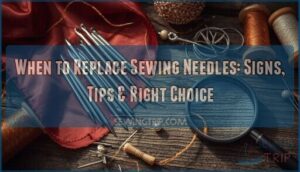This site is supported by our readers. We may earn a commission, at no cost to you, if you purchase through links.
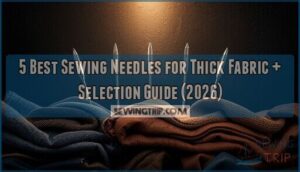
Most broken needles aren’t bad luck—they’re the wrong tool for the job. Force a standard needle through denim or upholstery leather, and you’ll hear that sharp snap within minutes. The needle isn’t failing; it’s telling you something.
Thick fabrics demand needles engineered for the task: reinforced shafts, specialized points, and sizing matched to both material density and thread weight. Get that combination right, and your machine runs cleaner, your stitches hold tighter, and your fabric stays intact.
The five needles reviewed here, plus the selection guide that follows, give you exactly what you need to make that call confidently.
Table Of Contents
- Key Takeaways
- Best Sewing Needles for Thick Fabrics
- Needle Size and Selection Guide
- Matching Needles to Fabric and Thread
- Choosing The Right Needle for Your Project
- Essential Sewing Techniques for Heavy Fabrics
- Needle Maintenance and Machine Care Tips
- Buying Guide for Heavy Duty Sewing Needles
- Frequently Asked Questions (FAQs)
- Conclusion
Key Takeaways
- Match needle size directly to fabric weight—sizes 100/16 to 110/18 for denim, canvas, and leather prevent breakage and skipped stitches where standard needles fail.
- Needle point shape determines success with specific materials: wedge tips slice cleanly through leather without tearing, while sharp points penetrate dense woven fabrics like denim and canvas.
- Replace heavy-duty needles every 6-8 hours of sewing or immediately when you notice skipped stitches, popping sounds, or thread shredding—worn needles damage fabric and ruin stitch quality.
- Thread weight must match needle eye size to maintain proper tension: 40-weight thread pairs with 90/14 to 100/16 needles, while heavier topstitching threads require size 18-20 needles.
Best Sewing Needles for Thick Fabrics
The right needle makes all the difference when you’re working with denim, leather, or canvas—wrong choice, and you’ll end up with skipped stitches or broken thread.
Pairing the right needle with the correct thread weight is just as crucial—this guide to common sewing stitch problems and fixes breaks down exactly what causes those frustrating skips and breaks.
Heavy-duty needles feature reinforced steel construction and specialized points designed to punch through multiple layers without bending.
Here are five top-performing options that handle thick fabrics like they’re supposed to.
1. Singer Heavy Duty Sewing Machine Needles
Singer’s Heavy Duty needles handle thick fabrics like denim and canvas with a reinforced shaft that resists bending under pressure. The chromium-plated finish reduces friction—your needle glides through multiple layers without snagging or dulling.
You’ll find the enlarged eye accommodates heavier polyester and cotton-blend threads while the sharp point penetrates precisely.
This five-pack includes sizes 90/14, 100/16, and 110/18, color-coded for quick identification. At $6.99, they’re compatible with Singer, Brother, and Kenmore machines using the standard 15×1 system.
Replace them every 6-8 hours of sewing to maintain consistent stitch quality.
| Best For | Sewers working with heavy materials like denim, canvas, leather, or upholstery who need reliable needles that won’t bend or break during multi-layer projects. |
|---|---|
| Needle System | 15×1 Standard |
| Primary Material | Chromium-plated steel |
| Machine Compatibility | Singer, Brother, Kenmore |
| Pack Quantity | 5 needles |
| Point Type | Sharp point |
| Primary Use | Heavy fabrics |
| Additional Features |
|
- Reinforced shafts resist bending when punching through thick fabrics like denim and canvas
- Color-coded sizing system makes it easy to grab the right needle without squinting at tiny numbers
- Compatible with most home machines (Singer, Brother, Kenmore) at under $7 for five needles
- Not suitable for delicate fabrics like silk or chiffon—these are strictly heavy-duty
- Needles require replacement every 6-8 hours of use to maintain quality stitching
- May not fit older or off-brand machines that don’t use the standard 15×1 needle system
2. Universal Leather Jeans Sewing Machine Needles
Universal leather jeans needles deliver the heavy-duty performance you need without the brand premium. The HLARTNET 50-piece pack features size 100/16 needles with a wedge-shaped point that slices cleanly through leather and dense denim—no tearing, no fabric damage. The reinforced iron alloy shaft resists bending when you’re stitching through thick seams, while the properly sized eye accommodates standard heavy-duty threads without fraying.
You’ll get broad compatibility with the flat shank design—these fit Singer, Brother, Pfaff, and most household machines using the 130/705H system. At under $10 for 50 needles, you’re covered for multiple projects without worrying about dulled tips mid-seam.
Replace them every 4-6 hours of heavy sewing or when you notice skipped stitches. Store unused needles in their case to prevent bending.
| Best For | Sewers tackling thick materials like leather, denim, and canvas who need a budget-friendly bulk supply of reliable heavy-duty needles. |
|---|---|
| Needle System | 130/705H Universal |
| Primary Material | Iron alloy |
| Machine Compatibility | Singer, Brother, Pfaff |
| Pack Quantity | 50 needles |
| Point Type | Wedge-shaped point |
| Primary Use | Leather and denim |
| Additional Features |
|
- 50-needle pack offers excellent value and ensures you have backups for multiple projects
- Size 100/16 with reinforced iron alloy handles thick fabrics without bending or breaking
- Universal flat shank fits most household sewing machines (Singer, Brother, Pfaff, etc.)
- Single size (100/16) limits versatility—not suitable for delicate or lightweight fabrics
- No warranty information provided, so quality consistency may vary
- Needles require replacement every 4-6 hours of heavy use, which can add up on large projects
3. Universal Sewing Machine Needles Assorted Sizes
An assorted needle pack solves the constant size-switching problem when you’re working on multiple fabric weights. The Kidoom 50-piece set covers you from 65/9 for delicate silks up to 110/18 for heavy vinyl and leather—ten needles per size in color-coded tubes so you’re not squinting at tiny numbers mid-project.
High-strength steel construction resists bending when you hit thick seams, and the slightly rounded universal point manages both wovens and knits without snagging. These fit standard household machines (Brother, Singer, Janome) using the 130/705H shank system.
You’ll also get three bonus bobbins and threading tools. At roughly $0.20 per needle, you can swap sizes freely without worrying about cost—just match the fabric weight to the number and stitch.
| Best For | Sewists who work across different fabric weights and want an affordable way to keep the right needle size on hand without buying individual packs. |
|---|---|
| Needle System | 130/705H Universal |
| Primary Material | High-strength steel |
| Machine Compatibility | Brother, Singer, Janome |
| Pack Quantity | 50 needles |
| Point Type | Slightly rounded universal |
| Primary Use | Multi-weight fabrics |
| Additional Features |
|
- Five sizes (65/9 through 110/18) handle everything from silk to leather in one set
- Color-coded storage tubes make it easy to grab the right needle without checking numbers
- Works with most household machines (Brother, Singer, Janome) and includes three free bobbins
- Not compatible with industrial machines
- Some users report inconsistent quality and needles that don’t last as long as premium brands
- May cause thread fraying on challenging fabrics
4. Schmetz Universal Needles Size 80 12
When you’re working across multiple fabric weights, eventually you’ll land on a project that calls for a true workhorse—that’s where Schmetz’s size 80/12 Universal needles come in. These needles are designed to handle medium-weight wovens like quilting cotton, linen, and lighter canvas with ease.
Pair these needles with the right foot for your fabric—a beginner’s guide to the best presser feet can help you decide between a walking foot for thick seams or a nonstick foot for tricky materials like vinyl.
The 0.8mm diameter and slightly rounded point allow the needles to glide through both woven and knit layers without snagging or skipping stitches, making them essential for layering fabrics in quilts or home decor projects. They use the standard 130/705 H system, ensuring compatibility with most household machines, including Singer, Brother, Janome, and Pfaff.
Each pack includes 20 needles across two cards, providing enough supply to complete several projects before restocking. While not intended for leather or heavy denim, these needles are reliable and affordable for everyday medium-duty sewing.
| Best For | Sewers and quilters working with medium-weight fabrics like cotton, linen, and lightweight canvas who need a reliable all-purpose needle for everyday projects. |
|---|---|
| Needle System | 130/705 H Standard |
| Primary Material | Standard steel |
| Machine Compatibility | Singer, Brother, Janome, Pfaff |
| Pack Quantity | 20 needles |
| Point Type | Slightly rounded universal |
| Primary Use | Medium-weight wovens |
| Additional Features |
|
- Compatible with most household sewing machines (Singer, Brother, Janome, Pfaff) using the standard 130/705 H system
- Slightly rounded point works on both wovens and knits without snagging or skipping stitches
- Great value with 20 needles included across two cards, enough for multiple projects
- Not designed for heavy-duty materials like leather, thick denim, or industrial fabrics
- Limited to one size (80/12), which may not suit all project requirements
- Quality and durability can vary depending on your specific machine and how often you sew
5. SINGER Sewing Machine Needles Size 14
At size 90/14, these SINGER needles hit the sweet spot for medium-weight woven fabrics—cotton blends, synthetics, and quilting layers included. Cold-forged steel construction keeps breakage and skipped stitches to a minimum, even through multiple fabric layers.
The larger needle eye accommodates standard thread without friction, and the color-coded T-shaped heads make swapping sizes during a project genuinely painless.
Compatible with Brother, Janome, Bernina, Kenmore, and Juki machines, they’re adaptable enough for most home setups. Just don’t push them into heavy denim or leather—they’re built for medium duty, not brute force.
| Best For | Home sewists working with everyday medium-weight fabrics like cotton, quilting layers, and synthetic blends on standard domestic machines. |
|---|---|
| Needle System | Universal Regular Point |
| Primary Material | Cold-forged steel |
| Machine Compatibility | Singer, Brother, Kenmore, Janome, Juki, Bernina |
| Pack Quantity | 5 needles |
| Point Type | Regular point |
| Primary Use | Medium-weight fabrics |
| Additional Features |
|
- Cold-forged steel construction holds up well through multiple fabric layers with fewer skipped stitches
- Larger needle eyes and color-coded T-shaped heads make threading and size-swapping quick and easy
- Works across a wide range of popular machines—Brother, Janome, Bernina, Kenmore, Juki, and more
- Some users reported needle brittleness or unexpected breakage
- Occasional quality control issues, including at least one report of an empty package
- Size 90/14 only, so they won’t work for heavy-duty fabrics like denim or leather
Needle Size and Selection Guide
Picking the right needle size isn’t guesswork — it’s a system. Both European and American sizing standards give you a clear way to match needle diameter to fabric weight.
Here’s what you need to know to read those numbers and make the right call.
European and American Needle Sizes
Two numbering systems dominate sewing needle selection — and mixing them up wastes time and ruins fabric. The Metric System uses European sizes (60–100) representing needle diameter in hundredths of millimeters. American Sewing Standards run 8–16, scaling with fabric weight. Both appear on most needle shanks for easy cross-reference.
Your quick Measurement Guide:
- European 90 = American 14 — standard for denim
- European 100 = American 16 — heavy canvas and leather
- Size Conversion formula: multiply European by 5, subtract 20
- Thread thickness must match needle diameter for clean stitches
Measuring Needle Diameter
Accurate needle diameter measurement puts you in control when thick fabric demands precision. Use digital calipers on the needle shaft mid-point—you’ll get readings within ±0.01 millimeters, essential for matching gauge systems to fabric density. Place the needle perpendicular to measuring faces and zero your tool first.
Diameter measurement reveals whether your needle meets tolerance standards for thick fabric projects, while precision gauging catches bent or worn needles before they damage material. Check both outer diameter and wall thickness for complete needle calibration.
Correlating Needle Size to Fabric Weight
Fabric weight drives every needle selection decision. Get this wrong, and you’ll battle skipped stitches, thread fraying, and torn seams.
For thick fabric projects, needle calibration starts with knowing your GSM range — then matching material compatibility precisely:
- Lightweight (chiffon, silk): Sizes 60/8–70/10 for delicate sewing precision
- Medium-weight (cotton, linen): Sizes 80/12–90/14 for balanced thread tension
- Heavy (denim, canvas, 400+ gsm): Sizes 100/16–110/18 for proper fabric density penetration
Fabric thickness determines needle size. For a deeper understanding of, explore guidelines that help achieve perfect machine performance. Match them correctly, and your machine performs perfectly.
Matching Needles to Fabric and Thread
Getting the needle-to-fabric match right is what separates clean stitches from a frustrating mess. There’s a logic to it — and once you see it, you’ll never guess again.
Here’s how fabric weight, thread, and material type each point you toward the right needle.
Fabric Weight and Needle Selection
Think of fabric weight as your calibration baseline — it drives every needle decision you make. Midweight materials land around 80/12 to 90/14.
Once material thickness climbs past 200 g/m², you’re looking at 100/16 or larger. Dense canvas and heavy denim demand 110/18, where needle calibration really earns its keep.
Fabric density directly affects sewing speed and thread tension, so matching needle size to fabric weight isn’t optional — it’s the difference between clean stitches and a snapped shaft. For more details about how fabric weight affects sewing, consider reading expert guidance.
Thread Weight and Needle Compatibility
Thread weight and needle selection are two sides of the same coin — get one wrong, and your stitch balance collapses. Heavier threads need larger needle eyes; a 40 wt thread pairs with 90/14 to 100/16, while 50 wt works with 80/12. Needle calibration accounts for both material thickness and fabric density simultaneously.
- Size 16 manages mid-weight threads cleanly
- Size 18–20 suits heavy topstitching threads
- Mismatched pairings cause thread tension failures
- Always test on scrap before committing
Needle Types for Leather, Denim, and Canvas
Now that thread weight is sorted, let’s talk about matching needle design to material — because the point shape matters just as much as the size.
Leather stitching demands a wedge or spear-tipped needle. That geometry slices cleanly through hide rather than forcing fibers apart, which prevents tearing and skipped stitches on leather, vinyl, and faux alternatives.
Denim sewing calls for reinforced shafts with ultra-sharp points. Multiple dense layers need that extra backbone — don’t use a standard needle here or expect it to bend under pressure.
Canvas piercing works differently. Slightly rounded tips slip between tight fibers instead of splitting them, reducing fraying on sailcloth or tent-grade material.
For heavy fabric overall, upholstery-spec sewing machine needles cover both thick material and heavy thread — ideal for furniture, automotive, and gear repair. Needle durability isn’t optional with heavy-duty needles.
Choosing The Right Needle for Your Project
Picking the right needle comes down to knowing your fabric, your thread, and how much punishment the material can take. Get that match wrong, and you’ll end up with skipped stitches, torn fibers, or a snapped needle mid-seam.
Here’s what to think about before you thread up.
Considering Fabric Type and Thickness
Your choice of needle starts with one question: what’s this fabric actually made of, and how dense is it? Denim and canvas sit at the heavy end of the scale — thick fabric with tight weave structures that demand sizes 16/100 to 18/110.
Upholstery fabric lands in the medium-heavy range, where a 14/90 manages material resistance without over-punching the weave. Leather and vinyl vary, but fabric density still drives needle selection every time.
Get that match right, and thread tension stabilizes naturally. Miss it, and you’re fighting your machine the whole way through.
Selecting Specialty Needles for Optimal Results
Once you’ve matched size to fabric density, the needle’s material and coating become your next lever. Standard steel works for most jobs — but specialty options change what’s possible on tough materials.
- Titanium-coated needles cut friction against coarse fibers, stabilizing thread tension across multiple layers
- Wedge-tipped leather needles slice rather than pierce, keeping stitch lines clean through dense hides
- Reinforced denim needles (sizes 90/14–100/16) resist deflection when sewing machine needles push through heavy-duty stacked seams
Match needle coating to fabric density. Your machine will thank you.
Maintaining Fabric Integrity With Proper Needles
Coating matters — but so does what happens to your fabric when the needle wears down. A dull or mismatched needle drags through thick fabric instead of penetrating cleanly, causing fabric distortion, thread breakage, and stitch quality that unravels fast.
Selecting the right heavy-duty needles reduces fiber stress by up to 25%. That means less fabric damage, cleaner seam lines, and no guesswork. Sharp needle, proper size, correct point profile — that’s how you protect fabric integrity on every pass.
Essential Sewing Techniques for Heavy Fabrics
Even the best needle won’t save you if your machine isn’t set up right for thick fabric. A few key technique adjustments make the difference between smooth seams and a tangled mess. Here’s what you need to get right before you start sewing.
Adjusting Machine Tension and Pressure
Tension is the silent variable that makes or breaks a seam on heavy fabric. Get it wrong, and even the best needle can’t save you.
For thick materials, drop your upper thread tension slightly — denim and canvas resist more than cotton, so looser tension prevents thread breakage and bottom-side looping. Bobbin tension may need a small clockwise turn to balance the stitch from below. Presser foot pressure should be firm enough for consistent fabric feed, but too much crushes delicate layers and causes puckering.
Machine calibration isn’t guesswork. Test every stitch regulation change on scrap fabric first. Adjust in small steps, check, repeat. That’s how you dial in clean, confident stitches.
Using Walking Foot and Proper Thread
A walking foot does one job — it keeps your top and bottom layers moving together. That’s non-negotiable when sewing with thick materials like denim or canvas.
- Foot alignment over the needle clamp screw prevents skipped stitches
- Fabric guidance with both hands stops layers from drifting
- Stitch regulation tightens up with a shorter stitch length on dense materials
- Thread tension drops slightly to match thread thickness — test on scraps first
- Needle calibration and sewing machine maintenance keep everything running clean
Get these five variables right, and your seams won’t lie.
Needle Maintenance and Machine Care Tips
Good tools don’t last forever — but with the right habits, they last a lot longer.
Keeping your needles and machine in shape doesn’t take much time, but skipping it will cost you.
Here’s what actually has an impact.
Regular Needle Replacement
Think of your needle like a razor blade—it dulls faster than you’d expect on heavy fabric. Replace heavy-duty needles every 6–8 hours of sewing, or sooner if you notice classic needle wear signs: skipped stitches, popping sounds, or thread shredding. Don’t wait for needle breakage to force your hand.
Treat your sewing needle like a razor blade—replace it every 6–8 hours before it fails you mid-seam
| Warning Sign | Action |
|---|---|
| Skipped stitches | Replace immediately |
| Popping or clicking sounds | Check and swap needle |
| Thread shredding or fraying | Change needle and thread |
| Difficulty piercing fabric | New needle required |
| Visible burr or bent tip | Discard—don’t reuse |
Smart needle storage tips—organizing by type in a labeled case—make replacement schedules straightforward. Solid sewing needle care keeps your needle selection sharp and your seams cleaner.
Cleaning and Oiling Your Sewing Machine
Your machine works hardest on thick fabrics—and that stress shows up fast in lint buildup and friction. Clean the bobbin area every 8–10 hours of sewing using a soft brush for sewing maintenance. Then apply one drop of sewing machine oil at designated metal contact points for proper machine lubrication.
- Unplug before any oil application
- Use only sewing machine-specific oil—never cooking or automotive substitutes
- Wipe excess oil immediately for fabric protection
- Log each cleaning date to stay on schedule
Storing and Organizing Needles
Disorganized needles waste time and dull faster than they should. Solid needle storage protects your investment and keeps needle selection stress-free.
- Storage Containers — Use clear, compartmented boxes for instant visual needle identification
- Needle Safety — Keep sharps in capped sleeves or metal tins to prevent pricks
- Organizer Systems — Label compartments by size and type; color-code by category
- Sewing Kits — Pack a portable subset for travel or quick-access projects
- Needle Maintenance — Inspect monthly, rotate stock, and log replacements to track sewing tool maintenance
Buying Guide for Heavy Duty Sewing Needles
Picking the right heavy-duty needle comes down to a few non-negotiable factors—and knowing them saves you time, money, and a lot of broken threads. Some brands consistently outperform others for thick fabrics, and where you buy matters more than you’d think.
Here’s what to look for before you spend a single dollar.
Key Features to Consider
Not all heavy-duty needles are built equal—needle material matters first. Stainless steel or nickel-plated construction gives you real needle durability through dense seams.
Match needle size to fabric density: sizes 16–18 handle most thick fabric without deflection.
Point style drives thread compatibility and fabric weight performance. Sharp points cut woven fibers cleanly; ballpoints protect knits.
At higher sewing speed, a reinforced shank prevents bending under pressure.
Recommended Brands for Quality and Durability
Once you’ve nailed the key features, brand matters more than you’d think. Quality control and manufacturing process differences between brands show up fast when you’re pushing needle size 16–18 through doubled canvas or stacked denim.
Here’s how the top contenders hold up in real durability tests:
- Schmetz Heavy Duty — Reinforced shafts, chromium-plated steel; the go-to for professional sewing needle selection
- Singer Heavy Duty — Consistent material selection, sharp points, trusted across fabric weight ranges
- Organ Titanium — Titanium coating extends lifespan notably; strong brand comparison winner for heavy-duty needles
- Gutermann Microtex — Precision-ground tips cut cleanly through leather and dense weaves
For sewing needles that won’t fail mid-seam, these four deliver.
Where to Buy Heavy Fabric Sewing Needles
Brand quality sorted — now you need to know where to actually get these needles without wasting time hunting.
| Source | Best For |
|---|---|
| Joann, Michaels | Schmetz, Singer heavy-duty needles in-store |
| Amazon, WAWAK | Bulk sewing machine needles, specialty stores online |
| Local Suppliers, Sewing Communities | Upholstery, weaving, and hard-to-find thick fabric options |
Online Retailers carry the widest selection. Local fabric shops and Needle Manufacturers’ authorized dealers give you hands-on guidance when it counts.
Frequently Asked Questions (FAQs)
What needle should I use for thick fabric?
Think of it as matching tools to a job. For thick fabric, use size 16–18 heavy-duty needles—they handle fabric density, maintain thread tension, and won’t buckle under pressure.
How to push a needle through thick fabric?
Push at a perpendicular angle for clean fabric penetration. Slow your pace—rushing tears fibers.
Prep edges to reduce bulk, and keep thread tension balanced for stitch control through heavy-duty needles.
How often should heavy fabric needles be replaced?
Replace heavy-duty needles every 5–6 hours of sewing. For thick denim or canvas, swap after 2–3 heavy seams. Skipped stitches or thread breakage? Change it immediately — don’t wait.
Can regular needles damage thick sewing materials?
Yes, regular needles can damage thick materials. They bend under resistance, cause skipped stitches, and leave torn fibers behind. Fabric damage risk is real — use heavy-duty needles instead.
What causes needle breakage when sewing canvas?
Canvas breaks needles fast. Wrong needle size, poor machine alignment, and high sewing speed are the main culprits.
Fabric density fights back hard when needle strength and thread friction aren’t matched correctly.
Do heavy fabrics require special sewing feet?
Thick fabrics demand specialized sewing feet for proper feeding and control. Walking feet prevent shifting across multiple layers, while Teflon or roller feet glide over sticky materials like leather—managing fabric thickness and presser foot pressure for clean stitches.
Which needle coating works best for vinyl?
Chrome plated needle coating works well for vinyl because it reduces needle friction control and heat buildup. For sticky vinyl surfaces, super nonstick surfaces prevent adhesion.
Titanium benefits include extended coating durability through demanding projects.
How does needle coating affect stitching performance?
PTFE coating lowers needle friction on dense denim, reducing fabric damage and improving stitch quality.
Titanium coating strengthens the edge for coating durability, while ceramic coating minimizes heat during repetitive stitching—essential for your needle selection guide.
Do curved needles work on heavy upholstery fabric?
Yes—curved needles excel on heavy upholstery because their bent stitch path lets you reach tight spaces without repositioning fabric. They reduce hand fatigue and prevent snagging around padding, especially when matched to proper point types.
What causes needles to break during heavy sewing?
Ever seen a needle snap mid-seam through leather? Needle breakage happens when you push too-thin needles through dense layers, run excessive sewing speed, crank thread tension too high, or use bent needles that can’t handle fabric density and machine alignment stress.
Conclusion
The thinnest needles often handle the thickest jobs—if they’re built right. Your sewing needle for thick fabric isn’t about brute force; it’s about matching shaft strength, point geometry, and sizing to the material in front of you.
Apply the selection principles here, stock the right sizes, and you’ll stop guessing. No more snapped needles mid-seam, no more puckered leather or skipped stitches through canvas.
Just clean penetration, solid lockstitch, and fabric that cooperates.
- https://topnotchsewvac.com/blogs/sewing-machine-blog/guide-to-choosing-the-right-needle-size-for-sewing-machine
- https://sewingmastery.com/15-reasons-why-a-sewing-machine-needle-breaks/
- https://klasseneedles.com/why-needles-break
- https://www.goldstartool.com/blog/how-to-prevent-needle-breakage-in-a-sewing-machine.htm
- https://marinefabricatormag.com/2018/01/01/needle-and-thread-know-how/

